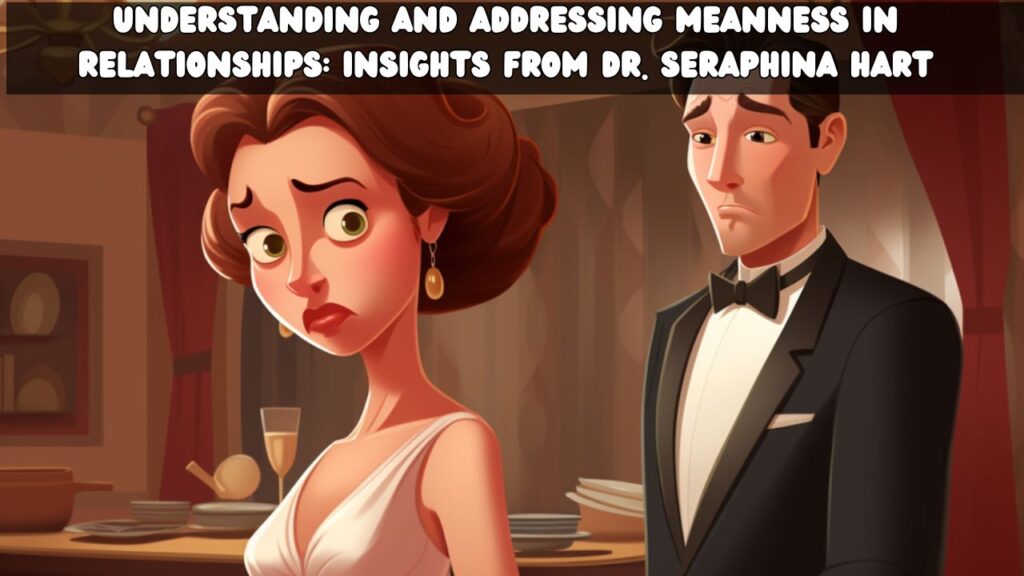Message to Dr. Hart
From: Ella
Age: 26
Partner: 28
Duration: 3 years
From: Canada
Hi Dr. Hart,
I’m Ella, 26, from Canada. My fiancé, who is 28, has recently started being quite mean to me. We’ve been together for three years, and this change in his behavior is both confusing and hurtful. Why is my fiancé so mean to me all of a sudden, and what can I do about it?
Dr. Seraphina Hart’s Response:
Communication is Key

In any relationship, especially one facing challenges, communication is the bridge that connects misunderstanding to understanding, conflict to resolution. It’s the tool we use to express our feelings, needs, and hopes. In your situation, Ella, effective communication is not just helpful; it’s essential.
Addressing the Issue Openly
Open, honest communication is the foundation of a healthy relationship. It’s important to express your feelings about the changes you’ve noticed in your fiancé’s behavior. However, how and when you communicate this is just as important as what you say.
- Choosing the Right Time and Place: Find a time when both of you are calm and not preoccupied with other stressors. This might be a quiet evening at home or a time when you’re both relaxed and undistracted. Avoid times when your fiancé is already stressed or tired.
- Using “I” Statements: When you talk to your fiancé, use “I” statements rather than “you” statements. This means expressing how you feel and how his behavior affects you, rather than accusing or blaming him. For instance, say, “I feel hurt and confused when you speak harshly to me,” instead of “You’re always mean to me.” This approach is less likely to make him defensive and more open to understanding your perspective.
- Expressing Your Needs and Feelings: Clearly express your feelings and needs. Let him know that his behavior is affecting your well-being and your perception of the relationship. It’s important that he understands the impact of his actions.
Listening to Their Perspective
After you’ve shared your feelings, it’s important to give your fiancé a chance to respond. This is a critical part of the communication process.
- Active Listening: Engage in active listening. This means fully concentrating on what your fiancé is saying, understanding it, and responding thoughtfully. It’s not just about hearing the words but also understanding the emotions and intentions behind them.
- Encouraging Openness: Encourage your fiancé to be open about what he’s experiencing. There might be stressors or issues that he’s dealing with that you’re unaware of. Understanding his side of the story can provide valuable insights into why his behavior has changed.
- Empathy and Validation: Show empathy and validation. If he opens up about stressors or challenges he’s facing, acknowledge his feelings. This doesn’t mean you agree with his behavior, but it shows that you are trying to understand his perspective.
Ella, remember that communication is a two-way street. It involves both expressing your own feelings and being open to hearing your fiancé’s. It’s about creating an environment where both of you feel safe to share your thoughts and feelings. By addressing the issue openly and listening to each other, you can start to understand the root causes of the problem and work together towards a solution.
Seeking Solutions Together

Navigating through rough patches in a relationship often requires more than just understanding each other; it calls for active collaboration in finding solutions. Together, you and your fiancé can work towards a healthier, more respectful way of interacting, especially when facing disagreements or stress. Let’s explore how you can establish boundaries and seek professional help if needed.
Establishing Boundaries
Boundaries in a relationship are essential. They are the guidelines that help you understand what is acceptable and what isn’t. Setting clear boundaries is a crucial step in addressing mean behavior.
- Defining Acceptable Behavior: Sit down together and define what behaviors are acceptable and which are not. It’s important for your fiancé to understand that mean behavior, including harsh words, dismissive attitudes, or any form of emotional abuse, is not acceptable.
- Communicating Your Boundaries: Clearly communicate these boundaries to your fiancé. Be specific about what actions or words feel hurtful to you. It’s not about setting rules for each other, but about expressing what you need to feel respected and safe in the relationship.
- Handling Disagreements Healthily: Discuss and agree on healthier ways to handle disagreements. This could include taking a time out when emotions run high, using “I” statements to express feelings, or agreeing not to discuss sensitive topics when either of you is already stressed or tired.
- Consistency is Key: Once these boundaries are set, it’s important to consistently maintain them. This means addressing boundary-crossing behavior every time it happens, not just occasionally.
Professional Help
Sometimes, despite your best efforts, you might find that the situation isn’t improving, or you uncover deeper issues that are difficult to handle alone. In such cases, seeking professional help can be a wise decision.
- Benefits of Relationship Counseling: A relationship counselor can provide a neutral, supportive space for both of you to express your feelings and concerns. They can offer insights into patterns of behavior and communication that you might not be aware of.
- Learning New Skills: Counseling can equip both of you with tools and skills for better communication, conflict resolution, and understanding each other’s needs. It can also help in addressing individual issues, like anger management or stress coping mechanisms, that impact the relationship.
- Support for Individual Issues: If your fiancé is struggling with personal issues like stress, anxiety, or depression, individual therapy for him in addition to couples therapy could be beneficial. This shows that you are supportive of his personal growth and well-being, which is vital for the health of your relationship.
Ella, remember that seeking solutions together is about teamwork. It’s about both of you working towards a common goal – a healthy, respectful, and loving relationship. Establishing boundaries and seeking professional help when needed are proactive steps towards building a stronger foundation for your future together.
Self-Care and Support

In the midst of navigating relationship challenges, it’s crucial not to lose sight of your own well-being. Self-care is not just an act of self-preservation; it’s an act of self-respect. It allows you to maintain your emotional and mental health, which is essential, especially when dealing with a difficult situation in your relationship.
Τaking Care of Yourself
Taking care of yourself means ensuring that your emotional and mental needs are being met. This can look different for everyone, but here are some ways you might consider:
- Talk to Friends or Family: Having a support system is invaluable. Talk to friends or family members whom you trust and feel comfortable with. Sharing your feelings and concerns can provide comfort, different perspectives, and sometimes, just the reassurance that you are not alone.
- Engage in Enjoyable Activities: Make time for activities that bring you joy and relaxation. Whether it’s a hobby, exercise, reading, or simply taking a walk, these activities can provide a much-needed break from stress.
- Seek Individual Counseling: If you find it difficult to cope, or if you need someone to talk to who can provide professional guidance, consider seeking individual counseling. A therapist can offer a safe space to explore your feelings and help you develop strategies to deal with the situation more effectively.
Evaluating the Relationship
It’s painful to consider, but if the mean behavior continues despite your efforts, it may be necessary to re-evaluate the relationship. This doesn’t necessarily mean ending the relationship immediately, but it does mean taking a serious look at whether the relationship is healthy and sustainable.
- Reflect on Your Relationship: Reflect on the overall health of your relationship. Are your needs being met? Do you feel respected, valued, and safe?
- Consider Your Future: Think about what you want in your future and whether your current relationship aligns with those desires. It’s important to be in a relationship where both partners are committed to treating each other with kindness and respect.
- Making Difficult Decisions: If you conclude that the relationship is not healthy and there’s little scope for improvement, it may be time to consider ending it. This is a difficult decision, but your well-being and happiness are paramount.
Ella, addressing why your fiancé is being mean is indeed not about finding a quick fix but involves a deeper understanding, effective communication, and sometimes professional intervention. It’s about nurturing a relationship that is healthy, respectful, and supportive. But more importantly, it’s about ensuring that your own emotional and mental health is not compromised. Take steps that feel right for you, and remember, your well-being is of utmost importance.
Warm regards,
Dr. Seraphina Hart, PhD
Dr. Seraphina Hart, PhD, is a relationship therapist with over two decades of experience in the field of psychology and human behavior. With a rich academic background from Stanford University, she has an in-depth understanding of the complexities of interpersonal relationships. Dr. Hart's journey began with a deep fascination with the human mind and how it forms emotional connections, leading her to specialize in relationship therapy.
Her compassionate approach and unique methodology are informed by her extensive study of various therapeutic modalities, including Cognitive Behavioral Therapy (CBT), Emotionally Focused Therapy (EFT), and mindfulness techniques. Dr. Hart believes in the power of empathy and understanding in healing and transforming relationships. With her guidance, clients learn to navigate their emotions, communicate effectively, and foster a deep sense of self-awareness.




You may like
Should I Marry Someone with Debt? Navigating Love, Money, and Future Together
Dealing with an Overbearing Mother-in-Law: How to Set Boundaries Without Harming Your Marriage
How to Apologize Effectively in a Relationship: 7 Steps to Show You Truly Care